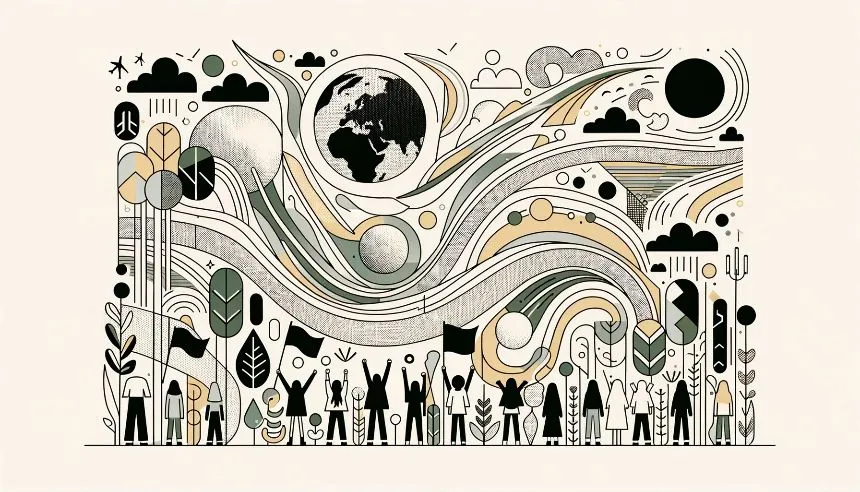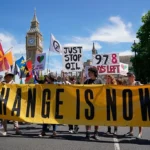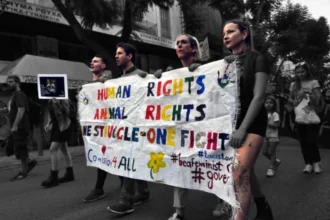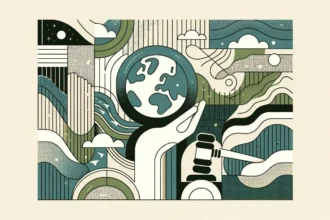Australia is witnessing a dynamic shift toward climate justice, driven by its youth. These young advocates are not merely educating their contemporaries; they’re at the forefront of grassroots movements, championing sustainability on both local and global scales. Their passion and commitment are palpable, and their efforts are gaining traction, resonating far beyond Australia’s shores.
The catalyst for this global youth uprising can be traced back to Greta Thunberg’s solitary protest outside the Swedish Parliament. Her call for urgent climate action, grounded in peace and determination, ignited a flame in young hearts worldwide. It wasn’t just a protest; it was a clarion call that resonated with millions, leading to a global youth-led movement.
From urban centers in Australia to remote corners of the world, young leaders are heeding this call. They’re mobilizing, organizing, and voicing their concerns about the planet’s future. Their message is clear: the climate crisis isn’t a distant threat; it’s an immediate challenge, an existential crisis that demands attention now.
Australia’s Pioneering Youth Climate Organizations
In the vast landscape of climate advocacy, three youth-led organizations in Australia stand out: School Strike for Climate (SS4C), Australian Youth Climate Coalition (AYCC), and Seed.
SS4C is a student-driven initiative, galvanizing young individuals to demand immediate and effective climate policies. Their strikes, echoing in streets across Australia, symbolize a generation’s plea for a sustainable future.
AYCC, a broader coalition, harnesses the collective power of young Australians. Through workshops, campaigns, and community engagements, they aim to bring about systemic change, ensuring that climate policies prioritize both the planet and its people.
The term ‘intergenerational justice’ is an ethical imperative that underscores the responsibility we hold towards future generations.
Seed, uniquely, represents the indigenous youth of Australia. Their mission transcends traditional climate advocacy, intertwining environmental action with the preservation of Aboriginal and Torres Strait Islander traditions and rights.
All three organizations underscore the importance of education for sustainability (EFS) rooted in human rights. Through online platforms, they disseminate information, rally support, and highlight the interconnectedness of climate change, human rights, and sustainability.
In their endeavors, they not only challenge the status quo but also inspire a generation to envision a world where sustainability and human rights are at the core of every decision. Their efforts, driven by passion and purpose, are reshaping Australia’s climate narrative, one action at a time.
Ethical Imperative of Intergenerational Climate Justice
The term ‘intergenerational justice’ is more than just a concept; it’s an ethical imperative that underscores the responsibility we hold towards future generations. In the context of climate change, this principle takes on a heightened significance, emphasizing the duty to ensure that the world we leave behind is one where future generations can not only survive but thrive.
Often, the narrative surrounding climate change places the onus of finding solutions squarely on the shoulders of the younger generation. They are frequently reminded that the escalating climate crisis will be their cross to bear, their challenge to overcome. This perspective, while acknowledging the proactive stance of the youth, inadvertently absolves older generations of their role in both the creation and the resolution of the crisis.
However, young activists and advocates are challenging this narrative. They argue that while they are ready and willing to take the lead in addressing the climate crisis, the responsibility should not be theirs alone. They emphasize the need for immediate, proactive measures, urging those in positions of power and influence to act now, rather than deferring action to a later time.
Furthermore, they call upon older generations to recognize the role they have played in exacerbating the climate crisis. Instead of passing the baton, the youth urge them to join the race, to collaborate in finding sustainable solutions. They stress that the fight against climate change is a collective endeavor, one that requires the combined efforts of both young and old.
Steering the Ship of Change
Australia’s younger generation, represented by impactful organizations such as SS4C, AYCC, and Seed, are not merely bystanders in the face of global challenges. They are the catalysts, actively shaping the narrative around climate justice and sustainable education rooted in human rights. Their unwavering commitment showcases their resilience and fervor, driven by a vision of a more equitable and sustainable world.
These young advocates are not waiting in the wings, hoping for change. Instead, they are at the forefront, championing causes, mobilizing communities, and influencing policies. Their actions, fueled by passion and purpose, are laying the groundwork for transformative shifts in how society perceives and addresses environmental and human rights issues.
Their endeavors go beyond mere activism; they are a source of inspiration. As they navigate the complexities of the climate crisis and advocate for justice, they ignite a spark in others. They demonstrate that age is not a barrier to making a difference, and that the vigor and perspective of youth can be powerful agents of change.
Adapted from an academic study for a wider audience, under license CC BY 4.0









